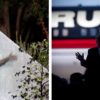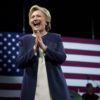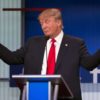Introduction
The Donald Trump who raged against big money’s influence on politics is back.
Trump on Monday night released a slate of lobbying and campaign finance proposals, catching reform advocates by surprise and pressuring Democratic nominee Hillary Clinton to detail her own lobbying reform positions.
Trump called for five-year bans on lobbying by executive branch officials, and a similar ban that would apply to members of Congress and congressional staff. He also proposed tightening the definition of lobbyists under the law so more people would be covered by the requirements that apply to lobbyists.
In addition, Trump said he would call on Congress to prohibit lobbyists for foreign governments from fundraising for American political candidates and seek a constitutional amendment to impose congressional term limits.
What Trump didn’t say: Most of the proposals’ prospects range from unlikely to inconceivable.
If elected, Trump could issue an executive order restricting the ability of former employees to lobby his administration, but anything permanent — or any ban that applies to the legislative branch — would have to be passed by Congress, historically a tough proposition.
Consider that the last major lobbying reform legislation passed by Congress was the Honest Leadership and Open Government Act of 2007, adopted nearly a decade ago in the wake of notorious ethics scandals and itself ridden with loopholes.
Constitutional amendments, meanwhile, are exceedingly rare and difficult to ratify. The most recent, the 27th amendment, which deals with congressional salaries, passed in 1992.
Since 1993, Congress has considered more than 1,000 constitutional amendment proposals — all have failed.
And much of Trump’s proposed lobbying reforms would hinge on exactly how Trump is proposing to define a lobbyist. The definition would determine who is subject to restrictions and disclosure requirements.
“It would be a terrific debate question if someone asked Mr. Trump, in 25 words or less, what would be your definition of a lobbyist,” said Nicholas Allard, the dean of Brooklyn Law School and a former head of the public policy practice at law firm Patton Boggs. Allard was a member of a 2011 American Bar Association task force on lobbying law that made a series of recommendations aimed at updating lobbying laws.
Some of Trump’s proposals sound good, said Robert Kelner, chairman of the election and political law practice group at law firm Covington & Burling. But, “I am very skeptical that they would actually be implemented in a robust way, especially because his proposal is very weak on details,” Kelner said.
Despite Trump’s criticism of big-moneyed interests earlier in the campaign, his plan includes little in the way of campaign finance reform proposals, suggesting only that he would move to restrict fundraising by lobbyists working on behalf of foreign nations — not lobbyists representing domestic interests.
Tangled history
Trump’s reform proposals are also saddled with his campaign’s own history.
In June 2015, Trump launched his campaign by promising he wouldn’t be in hock to lobbyists and special interests — unlike most other politicians.
“They’re controlled fully by the lobbyists, by the donors, and by the special interests, fully,” Trump said.
But as the campaign wore on, lobbyists entered the Trump inner circle. Paul Manafort, who lobbied and consulted for a wide range of foreign governments and entities, at one point ran Trump’s campaign.
And the political influence game proved Manafort’s undoing: He left the campaign in August while facing questions about whether he had fully disclosed all his lobbying work abroad, as required by law.
Trump, meanwhile, backed off his anti-big money rhetoric, even as Clinton and her primary opponent, U.S. Sen. Bernie Sanders of Vermont, pushed detailed proposals for campaign finance overhauls.
His proposals follow WikiLeaks’ release of Clinton campaign emails that show Clinton staff debated whether the campaign should accept money from lobbyists working for foreign governments.
After initially hesitating, campaign manager Robby Mook wrote he was “ok just taking the money and dealing with any attacks.”
In his prepared remarks for a speech delivered Monday night in Green Bay, Wisconsin, Trump described the exchange as “top officials in the Clinton campaign scheming to take massive sums of money from foreign lobbyists.”
Clinton’s lobbying ties
As for Clinton, she has voiced support for legislation that would extend the so-called “cooling off” periods that apply to some government employees from one year to two years, and would also change the definition of lobbyist so those evading restrictions on registered lobbyists would be forced to register and disclose more about their activities.
The legislation Clinton endorsed would also limit companies’ ability to pay bonuses to employees leaving to go into government.
Clinton has also reportedly restricted lobbyists from joining her transition team, according to Politico.
Neither candidate has said whether they would restrict lobbyists from joining their administrations, as President Barack Obama did, though several lobbyists received waivers from that rule. In addition, neither candidate has refused to take campaign contributions from registered lobbyists or lobbyists registered to lobby on behalf of foreign governments.
This month, Clinton’s campaign filed a report showing lobbyists raised nearly $300,000 for her campaign during the most recent quarter alone, something campaigns are required to disclose. Trump has not disclosed having any lobbyist fundraisers.
Yell ‘lobbyist!’
Advocates of campaign finance and lobbying reform generally hailed Trump’s proposals as a good step, but said they were either insufficiently detailed or didn’t go far enough to address the influence of money and special interests in politics.
“We’re glad that Donald Trump is finally offering policies to address the broken system he has spent months criticizing, but this proposal is not nearly enough to address voters’ concerns about our broken campaign finance system,” said David Donnelly, president and CEO of Every Voice.
Said Craig Holman, a government affairs lobbyist for advocacy group Public Citizen: “The fact that Trump is coming out and proposing some strict revolving door restrictions, as well as campaign finance limits on lobbyists, that’s a welcome position.”
Lawrence Noble, general counsel of the Campaign Legal Center, a group that advocates for ethics and campaign finance reform, said he didn’t see anything in Trump’s proposals that he disagrees with.
Nonetheless, he said, lobbying reform without campaign finance reform isn’t enough to solve the problem of money in politics.
“Anytime you want to distract people from issues of corruption, you yell ‘lobbyist!’ and everyone goes running off chasing the lobbyist,” he said. “Lobbyists are part of the problem, but just going after the lobbyists isn’t going to solve the problem.”
John Pudner, a former Republican political consultant who now heads a nonprofit group focused on money’s role in politics, Take Back Our Republic, said he met with representatives of the Trump campaign before the first presidential debate and provided suggestions, including some aimed at keeping foreign money out of elections.
Who We Are
The Center for Public Integrity is an independent, investigative newsroom that exposes betrayals of the public trust by powerful interests.
“The theme we laid out was we have got to stop foreign money from getting in,” he said, adding that he was encouraged by the proposals.
As for the prospect of a five-year ban, Pudner said Trump probably “realizes they wouldn’t go that far, but start with that as your negotiating point.”
Meredith McGehee, another member of the American Bar Association task force on lobbying who is now chief of policy, programs and strategy for reform group Issue One, said the recommendations were put into legislative form, but despite efforts, she has been unable to find a Republican co-sponsor.
McGehee said she hoped Trump’s proposals would give the idea of reform momentum.
But Trump’s key advisers on money and politics issue haven’t tended to favor new restrictions. McGehee pointed to Trump’s deputy campaign manager, David Bossie, who is on leave from the nonprofit group Citizens United, and his campaign’s lawyer, Donald McGahn, a former Federal Election Commission chairman known for resisting restrictions on money in politics.
“I take these proposals with a grain of salt because the folks he has surrounded himself with are folks who have not been supportive of this kinds of issues in the past,” McGehee said.
Read more in Money and Democracy
Money and Democracy
With morale in tatters, Federal Election Commission eyes changes
New ‘ombudsman’ office, better staff training among agency chairman’s proposals
Money and Democracy
Republican Aaron Schock fined for excessively soliciting super PAC funds
Former Illinois congressman to pay $10,000 penalty




Join the conversation
Show Comments